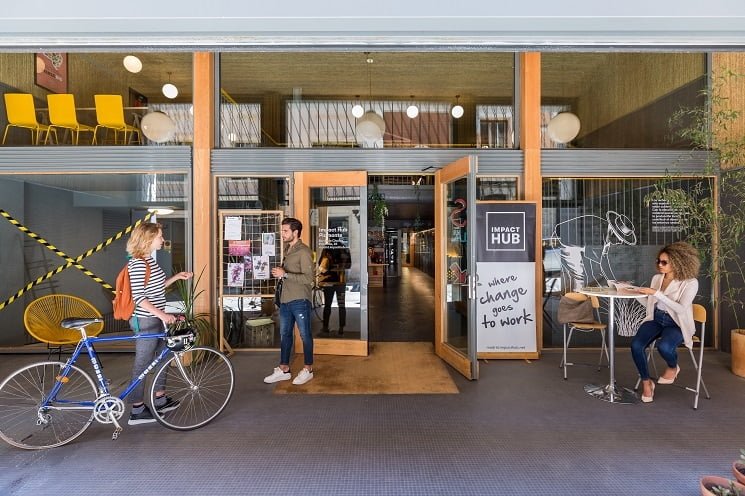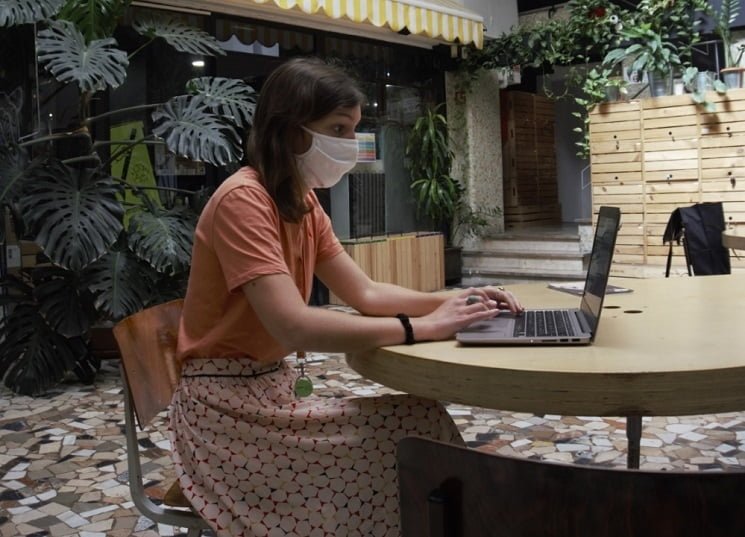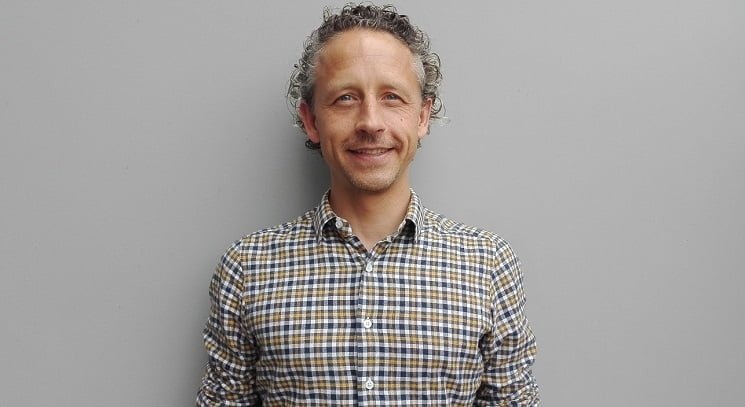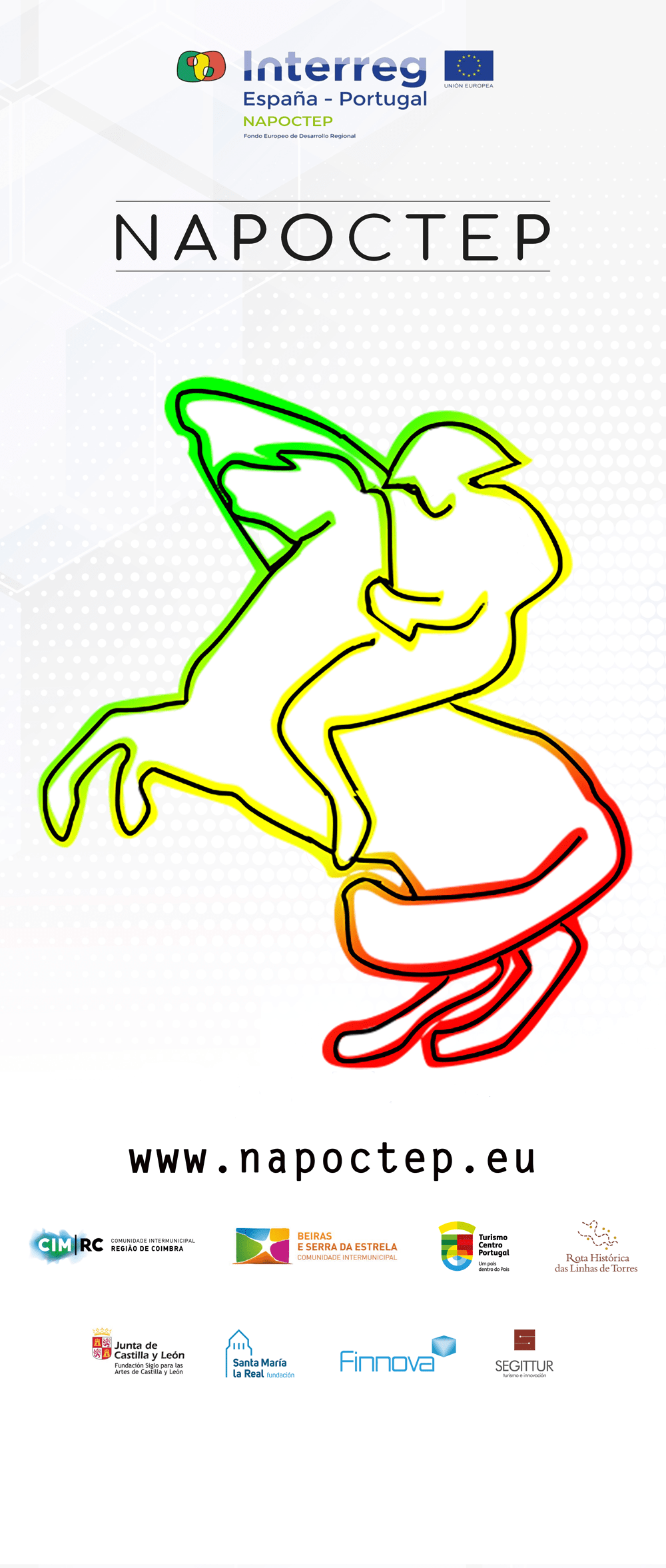Pablo Barrios Martinez – Madrid, 18.06.2021 – Gwladys, Clémence, Margot et David sont tous quatre coworkers au sein d’une des antennes de l’Impact Hub de Madrid. Tout en développant leurs activités respectives, ils partagent des valeurs et des projets, générés par le coworking, au sein de leur quartier.
Depuis la crise économique et financière de 2008, une nouvelle forme de standardisation des relations de production prend du poids sur le marché du travail. Cette manière de collaborer et de coopérer se consolide autant comme forme d’emploi, avec ses conséquences juridiques, que comme style de vie. L’économie circulaire et créative défie les fondements de l´économie traditionnelle : tandis que les jeunes professionnels sont beaucoup moins attirés par les structures formelles et hiérarchisées de grandes compagnies privées, les relations sociales horizontales marquent tendance au sein des petites et moyennes entreprises qui font partie des industries créatives et culturelles. La coordination de ces unités économiques se base sur l’égalité, la flexibilité et l’indépendance. Un échantillon de cette nouvelle main-d´œuvre peut se trouver dans les fameux coworkings qui sont un phénomène universel. Ces espaces partagés ont la capacité de canaliser ces relations de travail.

La ville de Madrid est un exemple vivant de l´instauration lente de cette nouvelle organisation du travail. Cette dernière décennie s’est matérialisée par l’établissement de plusieurs de ces espaces partagés tels que Wework, Utopicus et Impact Hub entre autres. Ce dernier a fait preuve de leadership sur le marché et a ouvert six établissements dans la ville de Madrid. Chacun de ces espaces dispose de sa propre identité, fruit des profils des professionnels qui composent les communautés qui partagent ces lieux de travail. Chez Impact Hub, « chaque espace a comme objectif dynamiser le quartier où il se trouve », affirme María Calvo, directrice de la section de Développement de commerce et de communauté, qui souligne la capacité du coworking à générer un impact avec valeur ajoutée dans le voisinage, en améliorant les Objectifs de Développement Durable des Nations Unies.

Ils sont Français et ont choisi de s’installer en coworking pour développer leur activité
L´écosystème de l´économie créative, de la connaissance et du bien-être d’Impact Hub n´est pas étranger à la communauté française qui fait aussi partie de ces lieux. Depuis septembre 2020, Gwladys, fondatrice de l’entreprise Ourson d´avril, qui propose des livres pour enfants personnalisés, a toujours été indépendante et travaille dans cet espace, « motivée par l´énergie qu´il propage » et, en même temps, parce que cela lui permet de « dissocier sa vie professionnelle et privée ».

Clémence Choffé est arrivée à Madrid en novembre 2020 et a commencé comme Host-volontaire à l´Impact Hub Picasso. Freelance en marketing digital, spécialisée en crowdfunding, elle continue à travailler avec tous ses clients français depuis Madrid. En même temps elle participe aux activités de l´économie sociale et solidaire générés par le coworking, pour trouver des projets espagnols sur lesquels elle peut se positionner. Le coworking lui permet de « développer son réseau à Madrid et de faire des rencontres », qui éventuellement lui permettraient de déboucher sur des opportunités professionnelles.
Dans le même esprit de pouvoir séparer son espace privé et professionnel, Margot Beclin est installée depuis janvier 2021 à l´Impact Hub d´Alameda où elle travaille pour le Groupe Kerry, une multinationale leader dans le monde des ingrédients, développant et fournissant des solutions aux entreprises du monde entier. Le coworking lui permet également de « voir d’autres personnes, de rencontrer des gens et de discuter en prenant un café ».

Depuis juillet 2016, David Lepez a lui aussi intégré cette communauté, en tant que spécialiste en marketing digital. Une partie de ses activités consiste à augmenter la visibilité des ONGs en ligne, « en accord avec les valeurs véhiculées par l’espace ». Très récemment, et dans la même dynamique, il a aussi développé un service de coaching en growth marketing pour PME et startups.










